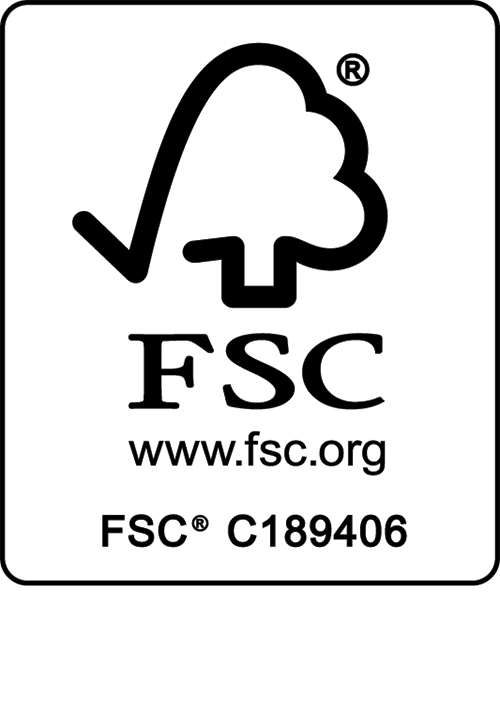




All of the materials we use are either FSC, recycled or biodegradable. We are also fully audited.
Our graphic designers can help bring your designs to life with our complimentary artwork service.
We love building lasting relationships with our customers. The same team member will stay with you every step of the way.
We offer very fast lead times as we manufacture in-house in our UK factory.
Check out our online reviews for peace of mind, we always leave our customers satisfied.
Hallmark Labels Ethical Trading Policy
At Hallmark Labels, we recognise that we – along with our suppliers – have a responsibility to operate ethically.
Promoting decent working conditions within our supply chains is part of our strategy to act in a socially responsible manner. To ensure we only ever partner with firms that share our values in this area, we require that all our suppliers comply with our Ethical Trading Policy, which is based on the Fundamental Conventions of the International Labour Organisation (ILO) and national and international laws.
We expect all our suppliers to have ethical processes and policies in place throughout their supply chain.
We will monitor supplier compliance with this policy through any of the following means:
- reviewing Modern Slavery statements
- auditing the supplier’s practices, using recognised methodology that allows us to recognise abuse of human rights
- mapping the origin and production of goods and reviewing any country-specific risks associated with the process
- monitoring risks to workers as brought about by inadequate working relationships and/or practices
- monitoring supplier use of sub-contractors and agencies to ensure compliance within these organisations
We will also use other practices and tools where necessary to support the risk management, continuous improvement, and capacity building of our suppliers, including the requirements for suppliers to provide reasonable information as evidence of compliance with our Ethical Trading Policy.
Coverage
This Ethical Trading Policy applies to all companies that supply goods or services to Hallmark Labels.
Responsibility
James Dawkins, Managing Director at Hallmark Labels, is responsible for implementing the Ethical Trading Policy.
Specific Supplier Requirements
Suppliers of Hallmark Labels are expected to have full visibility of their own supply chains. They are also expected to review and assess their own supply chains through ethical audits; mapping and tracing the supply of materials; assessing labour conditions; and any other reasonable means deemed necessary to comply with Hallmark Labels’ Ethical Trading Policy.
Breaches of Policy
If Hallmark Labels becomes aware of a breach or alleged breach of this Ethical Trading Policy by a supplier, we will be entitled to terminate the agreement with the supplier in question. Hallmark Labels reserves the right to audit or inspect any premises used within its supply chain and, in this event, expects the supplier to provide access to this premises and/or share supporting information to help us carry out a reasonable assessment of their practices and/or take the necessary remedial action.
Policy Commitments
Suppliers to Hallmark Labels shall commit to ensuring that the human rights of every worker in our supply chain are respected and protected.
They will do so by ensuring:
- Employment is freely chosen, and there is no forced labour, human trafficking and slavery
1.1 There is no forced, bonded or involuntary prison labour.
1.2 Workers are not required to lodge “deposits” or their identity papers with their employer and are free to leave their employer after reasonable notice.
2.1 Workers, without distinction, have the right to join or form trade unions of their own choosing and to bargain collectively.
2.2 The employer adopts an open attitude towards the activities of trade unions and their organisational activities.
2.3 Workers representatives are not discriminated against and have access to carry out their representative functions in the workplace.
2.4 Where the right to freedom of association and collective bargaining is restricted under law, the employer facilitates, and does not hinder, the development of parallel means for independent and free association and bargaining.
3.1 A safe and hygienic working environment shall be provided, bearing in mind the prevailing knowledge of the industry and of any specific hazards. Adequate steps shall be taken to prevent accidents and injury to health arising out of, associated with, or occurring in the course of work, by minimising, so far as is reasonably practicable, the causes of hazards inherent in the working environment.
3.2 Workers shall receive regular and recorded health and safety training, and such training shall be repeated for new or reassigned workers.
3.3 Access to clean toilet facilities and to potable water, and, if appropriate, sanitary facilities for food storage shall be provided.
3.4 Accommodation, where provided, shall be clean, safe, and meet the basic needs of the workers.
3.5 The company observing the code shall assign responsibility for health and safety to a senior management representative.
4.1 There shall be no new recruitment of child labour.
4.2 Companies shall develop or participate in and contribute to policies and programmes which provide for the transition of any child found to be performing child labour to enable her or him to attend and remain in quality education until no longer a child; “child” and “child labour” being defined in the appendices.
4.3 Children and young persons under 18 shall not be employed at night or in hazardous conditions.
4.4 These policies and procedures shall conform to the provisions of the relevant ILO standards.
5.1 Wages and benefits paid for a standard working week meet, at a minimum, national legal standards or industry benchmark standards, whichever is higher. In any event, wages should always be enough to meet basic needs and to provide some discretionary income.
5.2 All workers shall be provided with written and understandable information about their employment conditions in respect to wages before they enter employment and about the particulars of their wages for the pay period concerned each time that they are paid.
5.3 Deductions from wages as a disciplinary measure shall not be permitted nor shall any deductions from wages not provided for by national law be permitted without the expressed permission of the worker concerned. All disciplinary measures should be recorded.
6.1 Working hours must comply with national laws, collective agreements, and the provisions of 6.2 to 6.6 below, whichever affords the greater protection for workers. Sub-clauses 6.2 to 6.6 are based on international labour standards.
6.2 Working hours, excluding overtime, shall be defined by contract, and shall not exceed 48 hours per week.*
* International standards recommend the progressive reduction of normal hours of work, when appropriate, to 40 hours per week, without any reduction in workers’ wages as hours are reduced.
6.3 All overtime shall be voluntary. Overtime shall be used responsibly, taking into account all the following: the extent, frequency and hours worked by individual workers and the workforce as a whole. It shall not be used to replace regular employment. Overtime shall always be compensated at a premium rate, which is recommended to be not less than 125% of the regular rate of pay.
6.4 The total hours worked in any 7-day period shall not exceed 60 hours, except where covered by clause 6.5 below.
6.5 Working hours may exceed 60 hours in any 7-day period only in exceptional circumstances where all of the following are met:
- this is allowed by national law;
- this is allowed by a collective agreement freely negotiated with a workers’ organisation representing a significant portion of the workforce
- appropriate safeguards are taken to protect the workers’ health and safety; and
- the employer can demonstrate that exceptional circumstances apply, such as unexpected production peaks, accidents or emergencies
6.6 Workers shall be provided with at least one day off in every 7-day period or, where allowed by national law, 2 days off in every 14 day period.
7.1 There is no discrimination in hiring, compensation, access to training, promotion, termination or retirement based on race, caste, national origin, religion, age, disability, gender, marital status, sexual orientation, union membership or political affiliation.
8.1 To every extent possible, work performed must be on the basis of recognised employment relationship established through national law and practice.
8.2 Obligations to employees under labour or social security laws and regulations arising from the regular employment relationship shall not be avoided through the use of labour-only contracting, sub- contracting, or home-working arrangements, or through apprenticeship schemes where there is no real intent to impart skills or provide regular employment, nor shall any such obligations be avoided through the excessive use of fixed-term contracts of employment.
9.1 Physical abuse or discipline, the threat of physical abuse, sexual or other harassment and verbal abuse or other forms of intimidation shall be prohibited.


